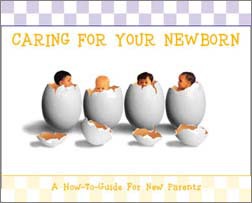 Spitting up
Spitting up
It is normal for babies to spit up once in a while. Most of the time spitting up is caused by babies eating too fast and swallowing a lot of air that they don’t burp. Bottle-fed babies are more likely to spit up than breast-fed babies. To help keep the milk down, burp your baby during and after each feeding. To burp your baby, lay a soft cloth across your shoulder. Position him on the cloth and gently rub or pat his back.
Spitting up and vomiting are not the same. Vomiting is more forceful and in larger amounts. A little vomiting is not serious. But, vomiting too often can lead to dehydration. If your baby vomits after every feeding, call your pediatrician. He may be allergic to his formula. Projectile vomiting is when large amounts of milk shoot out about a foot or so. If your baby has projectile vomiting more than once a day, call your pediatrician right away. Your baby may have an internal problem that should be corrected.
Weight gain
Weight gain is important during the first few weeks. It is normal for babies to lose up to 10% of their birth weight the first few days after birth. With proper nourishment, your baby should gain one-half to one ounce per day, and will regain his birth weight in about 2 weeks. Breast-fed babies may take a little longer than 2 weeks to regain their birth weight.
Bowel Movements (BMs)
Your newborn will pass a greenish-black, shiny stool during the first 24 to 48 hours. This stool, called meconium, results from fluid and mucous digested before birth. In a few days after the meconium is passed, your baby’s bowel movements will depend mostly on whether you breast-feed or bottle-feed. It’s normal for bowel movements to be brown, yellow or green and smell bad. Let your doctor know if your baby’s BMs are hard, black, red, pink or white or if you see any blood.
Bottle-fed babies tend to have 1 to 3 BMs each day. Their stool is light yellow-brown and formed. Breast-fed babies usually have mustard-yellow stool that is very soft and may occur as often as every feeding. After a few weeks most babies have only 1 or 2 BMs every few days. If your baby has trouble passing stool, and his belly becomes very swollen, call your pediatrician right away.

Caring For Your Newborn
Table of Contents
Introduction
Congratulations!
Caring Begins at Birth
Your Newborn’s Hospital Check-up
Ten Fingers and Ten Toes
Special Care for Your Newborn
When Your Newborn Cries
Changing Your Newborn’s Diaper
Feeding Your Newborn – breast or bottle feeding
Feeding Your Newborn – spit ups, weight gain, BMs
Bathing Your Newborn
Dressing Your Newborn
Shhh!! We’re Sleeping
Keeping Your Baby Safe
Your Newborn’s Admirers
Taking Your Newborn Out
If Your Newborn Gets a Cold
If You Have Questions
Well-baby Check-ups
When to Call Your Pediatrician
Take Care of Yourself, Too

